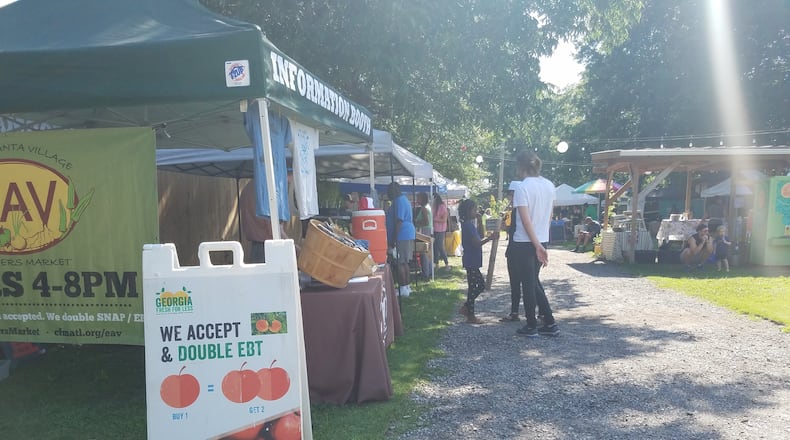Tina Jones goes with her two children every Thursday to the East Atlanta Village Farmers Market, where they buy many of the groceries they need for the week.
They’ve made the trip — sometimes by car, usually on bicycles — every week for about 10 years.
“We can buy fresh food that’s better quality than grocery stores, and it supports local farms,” she said.
But Jones said she’s concerned she may no longer be able to use the benefits her family receives from the Supplemental Nutrition Assistance Program, formerly known as food stamps, at the market because of changes to the technology that provides the service.
Austin, Texas-based Novo Dia Group, which wirelessly processes SNAP transactions at farmers markets across the country, recently announced it will soon stop operations. The company said a decision by the federal government not to renew its contract is forcing it out of business.
“I’m worried it’s going to create food deserts,” Jones said. “If we can’t shop here, the only place that would be within walking distance to our house is a gas station.”
Novo Dia will wind down its business at the end of August after the nonprofit National Association of Farmers Market Nutrition Programs stepped in with money to keep it afloat. The company initially planned to stop services Tuesday.
The extension gives farmers and farmers markets that use the service a chance to come up with a plan.
About 40 markets or direct-sale farmers use Novo Dia in Georgia. Many more of the state’s 90 farmers markets also accept SNAP but choose to use a different processing company, according to the state Division of Family and Children Services.
Ashley Dowling, the director of operations for the Atlanta-based Community Farmers Markets, which coordinates local farmers markets, said suspending service to those shopping with SNAP is "not an option."
“East Atlanta Village was the first farmers market (in Georgia) to accept SNAP,” she said. “The ability to process SNAP is embedded in our mission. While this equipment is expensive, we internally will work with our board of directors to ensure we have the financial support to purchase any equipment that is necessary.”
All nine locations in the Community Farmers Markets network use Novo Dia to process SNAP payments.
The software company is the only one on the market that is compatible with Apple products and processes SNAP incentives, such as a money-doubling program offered by Wholesome Wave Georgia. The organization matches SNAP dollars at participating farmers markets in the state, meaning when a shopper swipes his card for $10, he gets $20 to spend at the market.
Wholesome Wave Executive Director Denise Blake said the organization processes about 15,000 transactions across the state each year.
“That’s potentially thousands of Georgians who have to go back to traditional places (for groceries),” she said. “But we don’t have a doubling program at those retail facilities. There is an initial immediate impact for those SNAP recipients who are able to stretch those dollars even further.”
Dowling said SNAP recipients spent about $82,000 at the nine Community Farmers Markets last year through the Wholesome Wave doubling program.
Sagdrina Jalal, the executive director of the nonprofit Georgia Farmers Market Association, said she worried it would discourage use of farmers markets.
“We’ve worked hard to educate shoppers and communities on the value and importance of farmers markets and using SNAP benefits,” Jalal said. “We all want access to fresh, healthy food for our families, the opportunity to improve the local economy, and we encourage people to spend their money in their local community.”
If the service goes away, it would hurt both shoppers and farmers, Jalal said.
“We think about SNAP benefits. We always think about the recipients of SNAP,” she said. “What we don’t think about is SNAP dollars as currency just like cash or credit for the farmers. It’s a form of payment they depend on that can be a very significant portion of their income.”
Allyssa Ferguson, who runs Ernest Farms in Johns Creek, said 20 percent to 30 percent of the business she does comes from SNAP recipients. She said the SNAP program is part of the reason she sells her chicken and pork at the East Atlanta market.
“I want to truly be accessible,” she said. “The meat I sell is expensive, but I have to sell it at that price to sustain (the farm). It breaks my heart to think people could be priced out of having access.”
About the Author





